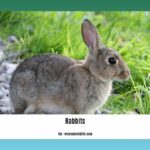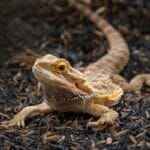So, you’re wondering if your beardie can enjoy a slice of cantaloupe? This guide covers everything you need to know about cantaloupe for bearded dragons—the potential benefits, risks, and how to offer it safely.
Cantaloupe and Your Beardie: Nutritional Benefits and Risks
Cantaloupe offers some nutritional value for bearded dragons. It contains Vitamin A, important for healthy skin, eyes, and immune function, and Vitamin C, another immune booster. Its high water content can also contribute to hydration. However, cantaloupe’s low calcium-to-phosphorus ratio and high sugar content mean it should only be an occasional treat. This imbalance may hinder calcium absorption, crucial for strong bones.
Serving Cantaloupe: Frequency and Portioning
Due to its calcium-phosphorus imbalance and sugar content, offer cantaloupe sparingly—no more than once or twice a week. Overconsumption can lead to digestive issues like diarrhea and potentially contribute to Metabolic Bone Disease (MBD) over time. Always prioritize staple foods like insects and leafy greens.
Cantaloupe Prep: A Step-by-Step Guide
- Wash Thoroughly: Rinse the cantaloupe under running water to remove dirt and pesticide residue.
- Remove Rind and Seeds: The rind is tough to digest and the seeds can be a choking hazard.
- Cut into Bite-Sized Pieces: Ensure the pieces are appropriate for your dragon’s size to prevent choking.
Spotting a Reaction: Signs of Trouble
After introducing cantaloupe (or any new food), monitor your dragon for digestive upset, including runny stools, lethargy, or decreased appetite. If you observe these symptoms, discontinue offering cantaloupe and consult a reptile veterinarian if symptoms persist.
Alternatives to Cantaloupe: Expanding Your Beardie’s Diet
While cantaloupe can be a treat, it shouldn’t replace nutritional staples. Insects (crickets, dubia roaches) should be the primary food source, providing essential protein. Leafy greens (collard greens, dandelion greens) offer crucial nutrients. Other suitable occasional treats include blueberries, bell peppers (red and yellow), and squash, always in moderation.
Baby Beardies and Cantaloupe: A Note of Caution
Baby bearded dragons have even greater calcium needs than adults. While a tiny nibble likely won’t harm them, cantaloupe shouldn’t be part of their regular diet. Focus on nutrient-rich insects to support healthy development.
Cantaloupe and Dehydration: When it Might Help
If your dragon exhibits mild dehydration signs (sunken eyes, lethargy, skin tenting), cantaloupe’s high water content may help. It can complement, but never replace, fresh drinking water. Consult a veterinarian immediately for suspected severe dehydration.
| Feature | Cantaloupe for Bearded Dragons |
|---|---|
| Frequency | Occasional treat (1-2 times/week maximum) |
| Benefits | Vitamins A & C, Hydration |
| Considerations | Poor Calcium-to-Phosphorus Ratio, High Sugar |
| Preparation | Wash thoroughly, remove rind and seeds, cut into small pieces |
Can bearded dragons eat cantaloupe? Yes, but moderation is crucial. By following these guidelines, you can offer cantaloupe as an occasional, safe treat, contributing to a balanced and healthy diet for your bearded dragon. Ongoing research continues to refine our understanding of reptile nutrition, so staying updated on best practices is always recommended.
Forbidden Fruits: Which Fruits are Toxic for Bearded Dragons?
Curious about which fruits your bearded dragon can and can’t eat? This is vital for their well-being, as some seemingly harmless treats can be dangerous.
Fruits Your Beardie Should Never Eat
Some fruits are entirely off-limits for your bearded dragon:
- Citrus Fruits (oranges, lemons, limes, grapefruit): Their high acidity disrupts digestion and can interfere with calcium absorption, potentially leading to MBD.
- Avocados: Contain persin, a toxin harmful to bearded dragons.
- Rhubarb: High in oxalates, which bind to calcium, hindering its absorption and potentially causing MBD and kidney problems.
- Grapes and Raisins: Can cause kidney failure.
- Star Fruit: Similar to rhubarb, it contains oxalates, posing risks to kidney function and calcium absorption.
- Fruit Seeds/Pits: Many contain cyanide, a highly toxic compound.
Fruits to Offer Sparingly
Some fruits are acceptable in moderation:
- Apples (remove seeds and core): Offer in small quantities due to sugar content.
- Peaches (remove pit): Nutritious but sugary; offer sparingly.
- Strawberries, Apricots (remove pit), Blackberries: Safe in small amounts but watch for potential digestive upset due to sugar.
- Cantaloupe and Watermelon: Offer infrequently due to high sugar and water content, and a poor calcium-to-phosphorus ratio in cantaloupe.
Building a Balanced Diet: Beyond Fruits
Fruits should be a small part of a bearded dragon’s diet (10-20%). Prioritize:
- Insects: Crickets, dubia roaches are crucial protein sources, especially for young dragons.
- Leafy Greens: Collard greens, dandelion greens, mustard greens offer vital nutrients, including calcium.
- Safe Vegetables: Squash, bell peppers provide further variety.
Recognizing a Bad Reaction: When to Seek Help
If your dragon ingests something unsafe, watch for lethargy, appetite loss, vomiting, or diarrhea. Contact a reptile veterinarian immediately if you notice any of these signs.
Calcium and Phosphorus in Fruits: A Quick Guide
The calcium-to-phosphorus ratio is crucial. Many fruits have a low ratio, meaning they can hinder calcium absorption if fed too frequently.
| Fruit | Calcium:Phosphorus Ratio | Notes |
|---|---|---|
| Apple | Low | Remove seeds and core. |
| Peach | Low | Remove pit. |
| Strawberry | Low | Offer sparingly due to sugar content. |
| Cantaloupe | Low | High in sugar and water; offer very infrequently. |
| Watermelon | Very Low | Very high water content; offer only as a very rare, tiny treat. |
By understanding which fruits are safe and which are harmful, you can help your bearded dragon thrive. Prioritize a balanced diet with fruits as occasional treats, not staples. Ongoing research continues to refine our knowledge of reptile nutrition, so staying informed is beneficial. Consult a reptile veterinarian for personalized advice.
The Ultimate Guide to Feeding Your Bearded Dragon Fruit: Safe, Healthy, and Delicious Options
Curious about the best fruits for your bearded dragon? This guide explores safe and nutritious fruit options, including information about cantaloupe and other beneficial choices.
Cantaloupe, while not entirely off-limits, should be offered sparingly due to its suboptimal calcium-to-phosphorus ratio. It does contain Vitamins A and C, and its high water content can aid hydration. However, its high sugar content and potential to hinder calcium absorption mean it should only be a rare treat.
When offering cantaloupe, always wash it thoroughly, remove the rind and seeds, and cut it into bite-sized pieces appropriate for your dragon’s size.
Beyond cantaloupe, several other fruits offer better nutritional profiles for bearded dragons:
- Berries (Blueberries, Blackberries, Raspberries): Packed with antioxidants and vitamins.
- Apples (remove seeds and core): A good source of fiber.
- Bananas (in moderation): Rich in potassium but high in sugar.
Variety is key! Offering a mix of safe fruits in small quantities can add diversity to your dragon’s diet.
Remember, fruits should comprise only 10-20% of a bearded dragon’s diet. Prioritize insects and leafy greens for optimal nutrition. Fruits are best viewed as occasional treats.
After introducing any new food, observe your dragon for signs of digestive upset. If you notice diarrhea, lethargy, or changes in appetite, discontinue offering that food.
| Fruit | Safe? | Notes |
|---|---|---|
| Cantaloupe | Occasionally | Small amounts, not too often, remove rind and seeds |
| Berries | Yes | Good source of antioxidants |
| Apples | Yes | Remove seeds and core |
| Bananas | Moderation | Limit due to sugar content |
A balanced and varied diet is essential for a healthy bearded dragon. Offering appropriate fruits in moderation can contribute to their well-being, but always prioritize staple foods like insects and leafy greens.
Forbidden Veggies: The Ultimate Guide to Toxic Vegetables for Bearded Dragons
What vegetables are safe for your bearded dragon, and which ones are absolutely forbidden? This guide will help you navigate the world of dragon-safe veggies and avoid potential hazards.
Toxic Vegetables: A Bearded Dragon’s No-No List
Some vegetables are toxic to bearded dragons and should be strictly avoided:
- Allium Family (Onions, Garlic, Chives, Leeks): These contain compounds that damage red blood cells and can cause serious health problems.
- High-Oxalate Vegetables (Spinach, Rhubarb, Beet Greens): While not acutely toxic, oxalates bind with calcium, preventing its absorption and potentially leading to MBD over time. Limit these significantly.
- Avocado: Contains persin, a toxin harmful to bearded dragons.
- Mushrooms: High in phosphorus and acidic, disrupting the calcium-phosphorus balance. Avoid or offer extremely sparingly.
Safe Vegetable Choices: Building a Healthy Diet
Many safe and nutritious vegetables can be offered regularly:
- Acorn Squash: Offer daily, raw or cooked.
- Bell Peppers (all colors): Excellent sources of vitamins.
- Butternut Squash: Nutrient-rich, offer in moderation.
- Green Beans: Offer chopped into manageable pieces.
Cantaloupe, while not toxic, has a poor calcium-to-phosphorus ratio. Offer it very sparingly as an occasional treat.
Keeping Your Beardie Safe: Washing and Preparation
Always wash all produce thoroughly to remove pesticide residue before offering it to your dragon.
| Safe Vegetables | Offer Frequency | Preparation |
|---|---|---|
| Acorn Squash | Daily | Raw or cooked |
| Bell Peppers (all colors) | Regularly | Raw |
| Butternut Squash | Moderation | Cooked or raw (small pieces) |
| Green Beans | Regularly | Chopped into small pieces |
| Vegetables to Avoid | Reason |
|---|---|
| Onions, Garlic, etc. | Damage red blood cells, digestive upset |
| Spinach, Rhubarb | High in oxalates, interfere with calcium absorption |
| Avocado | Contains persin, a toxin harmful to bearded dragons |
| Mushrooms | High in phosphorus, acidic, can disrupt calcium balance |
A balanced and varied diet is crucial for your bearded dragon’s health. By offering a variety of safe vegetables and avoiding toxic ones, you can help your dragon thrive. Remember to consult with a reptile veterinarian for personalized dietary advice.
Uncover the mysteries of twilight and discover the fascinating truth about whether deer are truly creatures of the night by exploring this insightful article: are deers nocturnal.
- Savings Plus: A California State Employee’s Guide to 401(k) and 457(b) Plans - December 19, 2024
- StruXure Pergola Costs: A 2024 Guide to Pricing & Factors - December 19, 2024
- Tari Airdrop: Your Complete Guide to Earning XTM (and Why It Matters) - December 19, 2024












